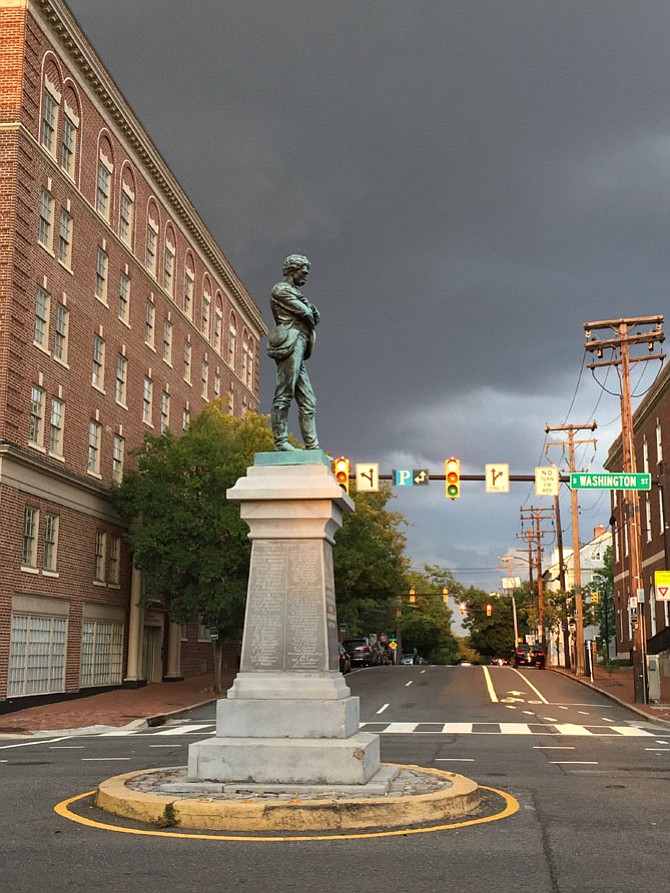“Appomattox” at 7:27 p.m., Aug. 25, as a huge gray cloud was traveling from the east over Old Town while sun was setting in the west. Photo by Laura Mae Sudder
“Appomattox” has held place at the intersection of South Washington and Prince streets in Old Town since the United Confederate Veterans erected it there in 1889. He stands in a posture of repose, arms folded, head bowed, pondering. He doesn’t carry a weapon, just a small pouch that slings across the chest to rest on his right hip. It’s the slouch hat, lazily drooping from his right hand that gets attention, subtly conveying the resignation and surrender of a former Confederate soldier. According to the inscription, he grieves for all those who died fighting for the cause of the defeated South.
The U.S. Civil War of 1861-1865 was the most deadly in our nation’s history. Estimates are that over 750,000 Americans died in that bloody conflict due to battle, disease, starvation or accident — far more than the total of all U.S. soldiers killed in WW I, WW II, the Korean War and Vietnam. Some two million men fought for the Union, one million for the Confederacy, with the Union side sustaining much greater losses. The average age was 26. One in four men who headed off to war never made it home. The vast majority of dead were buried in mass graves or left behind to decompose where they lay. These are shocking statistics.
Back to our familiar Confederate. I grew up in Alexandria, and even as a kid understood that here was a man whose cause was lost. I always admired the sculpture. His resigned, brooding posture provokes a kind of contemplation, as opposed to any sort of celebration. While he mourns the hundreds of thousands of Confederate dead, we also hear the echo of a greater multitude of young men who perished for the only just cause: the preservation of our Union and the abolition of slavery.
I believe that most Alexandrians are proud of our city and want our memorials to stay. Our streets are named after both Southern and Northern figures. We host the boyhood home of Robert E. Lee, George Washington’s parish church and several cemeteries that hold hundreds of Civil War veterans. If, as the City Council and Mayor Silverberg suggest, Alexandria should be purged of the names and monuments they deem offensive, our tangible past will be lost. I wonder if future Alexandrians will ever see and learn absent these visual reminders that encapsulate so much of our fascinating, painful past.
Saturday night following the Charlottesville debacle, an Alexandria police officer was posted on South Washington Street just opposite Appomattox. I could only surmise it was to guard the statue from a potentially destructive mob. Please, I prayed, not in my city.
Next time you travel Washington Street, take a good look at our dejected Appomattox. He’s likely regretting that the war had ever happened, or straining to remember the name or face of a fallen comrade. Perhaps he’s looking down the street at Freedmen’s Cemetery and reflecting on the thousands of unremembered slaves who also perished. Or maybe he’s just asking “Why?”
